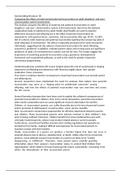Samenvatting
Samenvatting Belangrijkste stukken tekst week 3B justitieel ingrijpen
- Instelling
- Universiteit Van Amsterdam (UvA)
De belangrijkste stukken tekst van de literatuur voor week 3B voor het vak Justitieel ingrijpen. De Nederlandse literatuur in het Nederlands en de Engelse literatuur in het Engels. Comparing the effects of maternal and paternal incarceration on adult daughters’ and sons’ criminal justice syst...
[Meer zien]




